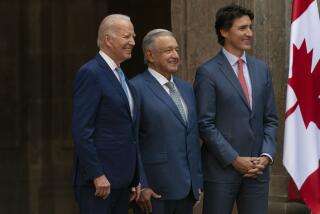PERSPECTIVE ON ENERGY : Tap Into Latin America’s Energy Potential
- Share via
The upheaval in the Middle East has flashed like a bolt of lightning illuminating the precarious position of the world’s energy supplies. Fortunately, important alternatives to Middle East oil supplies exist right here in the Western Hemisphere, if we have the foresight to cooperate with our Latin American neighbors to bring them into production.
It is no secret that Latin America’s supply of natural resources, oil and energy constitute one of the world’s most important mineral reserves. Mexico and Venezuela are not the only oil-rich countries in Latin America; Ecuador, Colombia, Peru and Argentina have large untapped reserves. If opened to full production, the energy supplies of Latin America could become the bulwark of the industrialized world.
We propose the formation of a Inter-American Energy Community. The concept is a natural complement to President Bush’s proposals for a broad program of free trade zones, significant reductions in official bilateral debt owed to the United States and new mechanisms to encourage investment in Latin America.
But an Inter-American Energy Community is more than an adjunct to the Bush initiatives. It could really make them work. To tap the full potential of the Americas, we must begin to think not only along geographic but sectoral lines, to link all the countries in specific well-defined areas that will lay the groundwork for broader cooperation. Energy is the obvious first sector.
Building an Inter-American Energy Community could set the practical parameters of cooperation in the Americas in the same way the European Coal and Steel Community began the transformation of Europe. It would give all the nations of the hemisphere practical experience of working together on hard issues that cut across the boundaries of all of our nations. It would provide the opportunity to strengthen inter-American institutions in a way that involves real issues on a hemispheric scale.
More to Read
Sign up for Essential California
The most important California stories and recommendations in your inbox every morning.
You may occasionally receive promotional content from the Los Angeles Times.













